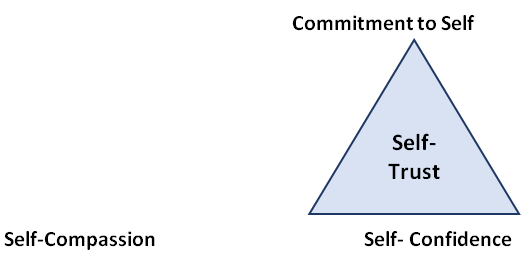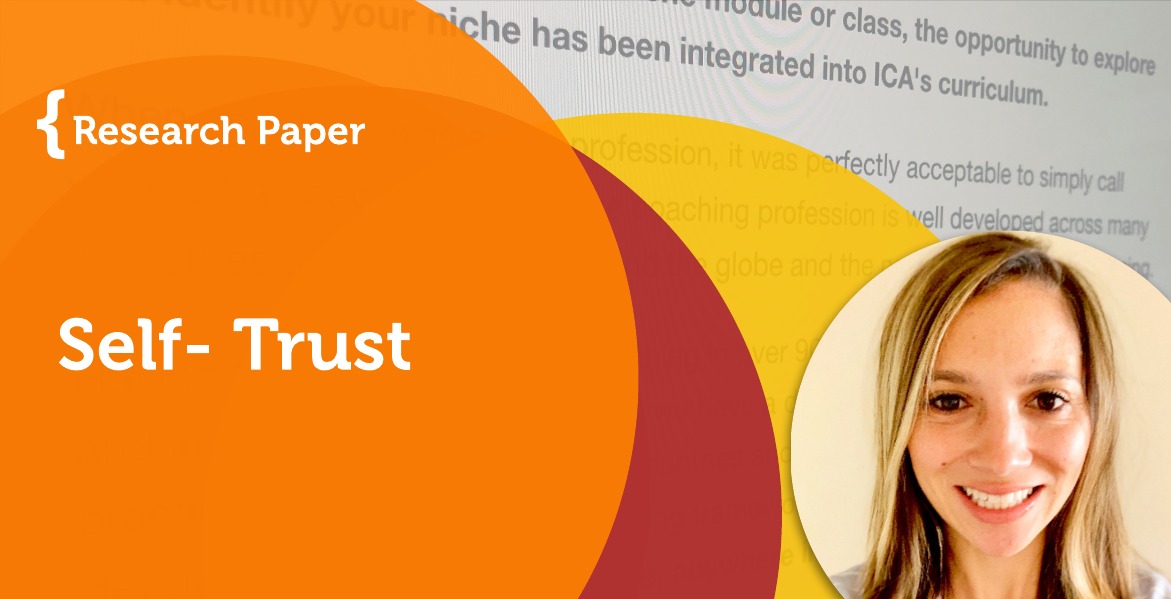Research Paper By Kristin Vierra
(Life & Career Coach, ARGENTINA)

Self- trust means that even with external wisdom and advice, you understand there’s no answer more aligned than your own.- Yasmine Cheyenne.
Self-trust has varying definitions. Merriam Webster defines it as “great faith in oneself or one’s abilities.” The freedictionary.com defines it as “self-confidence.” Dictionary.com defines trust as “reliance on the integrity, strength, ability, surety, etc. of a person or thing” (oneself). Here we see patterns of self-confidence, faith in oneself, and self-reliance. Yet, what factors into self-trust? What is its importance? How does one actually “trust oneself”? In this paper, I will dive deeper into the concept of self-trust, it’s supporting structures and the critical part it plays in the coaching journey.
I define self-trust as an individual’s commitment to oneself to live a life in alignment with what brings one fulfillment and the belief that one is fully capable of reaching it. Further defining self-trust, I see it as being broken down into supporting areas including a commitment to self, self-compassion, and self-confidence. These three areas are all inter-connected and strengthening any of the three also leads to cultivating one’s self-trust.

Commitment to Self
An important element of self-trust is one’s commitment to self. Committing to oneself can differ for each individual. It can be getting in touch with one’s intuition/inner guide, defining one’s values, questioning one’s beliefs, finding purpose, or removing outside influences to determine what sparks a light in one’s soul and pursuing this passion. In each case, the commitment involves an individual making a conscious decision to choose for oneself and oftentimes to choose differently. To honor oneself in pursuit of what brings greater happiness or fulfillment. This commitment can also involve changing habits, reframing perspectives, changing the environment, or acting differently. Regardless of the commitment, it is made to oneself on the foundation of the individual’s beliefs, needs wants, or desires.
What does it look like to lack the commitment to self? A lack of commitment to self can leave people feeling lost, stuck, or out of alignment. They may have ideas of what they want to pursue but also huge fears and doubts that are blocking them. It could be that they are living their life based on societal expectations rather than their own. It could be that they don’t believe they are capable of living a life based on their expectations. Or, it could be that they have been conditioned to live up to others’ expectations and fear the unknown of a life committed to self. Either way, it takes people making a conscious decision to commit to themselves, become aware, and explore their wants, needs, desires, etc. to move into this path. Thus, committing to oneself is a critical decision in pursuit of living with greater happiness and self-trust.
Let’s take an example of the story of Jane. Jane finished her college career motivated to join the workforce in hopes of one day becoming a Partner at a top Accounting firm. However, two years into her career, she found herself miserable and burnt out from the countless hours and lack of passion in her work. She’d call her parents seeking advice, only to hear them say, “You have a great job that pays well at a great company, you need to stick it out and continue to build your career.” Jane knew she couldn’t sustain this misery for years to come, but the influence of her parents weighed on her decision. After six months of long hours and many nights of tears drowned in ice cream, Jane decided to leave the role and look for work that brought her greater fulfillment. Jane removed the outside influences, looked inward, and made the decision to commit to herself and leave the job. In honoring herself, Jane was building greater self-trust.
Self-Compassion
Self-compassion is another area that contributes to strengthening self-trust. Self-compassion is not just about self-care practices and support. While those practices help, expanding one’s self-knowledge plays a vital role in building self-compassion. Self-knowledge is gaining a greater understanding of oneself, one’s triggers, repeated behaviors, shadows, and underlying beliefs. It’s expanding this awareness from a place of acceptance and learning rather than judgment. Then using the awareness to commit to oneself (as mentioned above) to choose to respond and act differently when faced with a repeated challenge or lesson. Individuals’ growth in self-knowledge allows them to practice more self-compassion. They can recognize patterns, forgive themselves for the pastor repeated behaviors that no longer serve them, and choose how to respond moving forward.
Kristin Neff, author of Self-Compassion states, “Perhaps most importantly, having compassion for yourself means that you honor and accept your humanness. Things will not always go the way you want them to. You will encounter frustrations, losses will occur, you will make mistakes, bump up against your limitations, fall short of your ideals. This is the human condition, a reality shared by all of us.” In her definition, she proceeds to describe that the more you open yourself up to this reality rather than fight against it, the deeper compassion you will feel for yourself (Neff, 2020).
In Psychology Today’s article “Compassionate Self-Awareness, A New Concept,” author Leslie Becker-Phelps describes the contrast between those that are self-critical and self-compassionate. Leslie mentions how the self-critical generally attack themselves and are their victims. That their self-criticism often feeds off itself and creates feelings of being weak and unworthy. In contrast, she describes those that are self-compassionate as gentler with themselves and “curious and accepting as they question their experiences, behaviors, and motivations.” She mentions how the self-compassionate study their flaws, learn about themselves and work to solve or make peace with personal problems. Leslie states, “by accepting their flawed selves, the self-compassionate individuals feel a greater sense of well-being while also working effectively toward personal changes in the future.” Overall, Leslie’s article demonstrates how self-criticism can be detrimental to one’s self-trust as it puts the individual in a place of disempowerment. On the other end, self-compassion empowers the individual to accept and understand one’s flaws, work towards change, and thus strengthens self-trust.
Let’s refer back to the story of Jane. Jane enters a new career where she is advancing and feeling much happier in her day-day. Jane always strives to do her best work but starts to become more aware of her struggles with perfectionism. She allows small mistakes like a typo in an email or an incorrectly sent invite to weigh on her for hours on end. As time goes on, this becomes more and more apparent to Jane. She starts to realize how this tendency goes way back to primary school when she’d get down on herself for a less than perfect score. Jane becomes aware that her perfectionist tendencies are no longer serving her. This knowledge leads her to practice more self-compassion. Instead of criticizing herself for mistakes, Jane decides to brush it off, learn from it, and move on. Now when Jane mistakenly sends an invite out to the wrong team at work, she simply apologizes and corrects it. Old Jane would have dwelled on it for hours but new Jane catches the error, decides to always double-check moving forward, and continues with her workday. Jane is practicing more self-compassion and is building self-trust.
Self-Confidence
Self-confidence also largely contributes to one’s level of self-trust. I define self-confidence as an individual’s belief in their ability to persevere despite fears, obstacles, and challenges. It’s an individual moving from a place of “I can’t” to “I CAN and “I WILL”. It is self-assurance, faith, and trust that one is fully capable of reaching the desired result. In Tanya Peterson’s article, What is Self-Confidence? she states, “Self-confidence, then, is the courage to know yourself, believe in yourself, and act on your beliefs. A definition of self-confidence is a positive feeling about oneself and the world that leads to courageous actions born out of a sense of self-respect” (Peterson, 2017). Thus, those who are self-confident believe in their abilities and are empowered to take action.
In Psychology Today’s article “Why Self Confidence Is More Important Than You Think”, Barbara Markway describes how self-confidence is linked to several elements that lead to a happier life including less fear and anxiety, greater motivation, more resilience, improved relationships, and a stronger sense of your authentic self. When she dives deeper into the role of a stronger sense of the authentic self, she mentions:
Finally, confidence roots you in who you are. You’ll be able to accept your weaknesses, knowing they don’t change your self-worth. You’ll also be able to celebrate your strengths and use them more fully. Your actions will be in line with your principles, giving you a greater sense of purpose. You’ll know who you are and what you stand for. You’ll have the skills to show up, stand up, and speak up. In other words, you’ll be able to let your best self shine through” (Markway, 2018).
I believe Barbara’s words tie it all together nicely and that the only statement missing is… in other words, you will trust yourself.
Referring back to Jane, Jane started her career lacking confidence. Her confidence was further broken down by not receiving an early promotion, comparing herself to colleagues, and countless small mistakes. However, Jane’s confidence rose when she left the role she was unhappy in and transitioned to a more fulfilling career. As she became more aware of patterns like her perfectionism and acted with more self-compassion, Jane’s confidence continued to grow. Jane started to step up and go after exciting, challenging projects despite her fears. With each project she successfully executed, she continued to strengthen her confidence. Jane found that working in alignment with her values and passions propelled her forward towards greater self-confidence.
Here, we see all three concepts connect in Jane’s story. Jane made the conscious decision to commit to herself and pursue a career aligned with her passions and values despite fear and outside influences. In her new job, Jane gained self-knowledge and grew aware of old patterns that were no longer serving her, acted differently, and was kinder to herself. As she continued to honor her desires, act with self-compassion, and go after what brings her fulfillment, Jane strengthened her confidence. Jane has now built greater self-trust and when faced with a difficult decision or challenge, feels she is capable of managing it. As shown by her story, Jane’s commitment to self, self-compassion, and self-confidence all play an important role in strengthening her self-trust.
A coach plays an important role in supporting clients on their journeys to building and sustaining self-trust. As seen by the complexities above, this is no easy feat to attain. However, it leads to people living with greater happiness and fulfillment.
Clients may come to a coach lacking self-trust and seeking guidance. For example, a client may come to the coaching conversation and say, “I want to change careers…but I could never find a job in the field I love.” Or, “I want to lose 10 pounds…but I can never make it to the gym.” The coach will be able to recognize by the client’s tone of voice, language, and word choice when limiting beliefs, fear, and self-doubt are at play. Through presence, active listening, powerful questioning, and creating action the coach can support the client in shifting this narrative and building self-trust.
One way the coach can support clients by creating a safe space for them to discovers and share their values, beliefs, and purpose. Through the removal of external influences, fear, and judgment, the coach can guide clients to look inward and find what brings them greater fulfillment. Identifying this allows clients to follow their inner guidance and make choices authentic to themselves. As mentioned in the ICA module Trust vs Doubt, “To trust ourselves we need to know what our beliefs are, our values and our purpose. To lose self-trust is to lose sight of these. When we are clear about who we are and know it to be right then we implicitly trust what we are doing and where we are heading” (ICA, Trust vs Doubt). Thus, supporting clients in gaining clarity on their beliefs, values, and purpose can build self-trust.
A coach can also support clients’ journeys to self-trust through the creation and achievement of small, realistic action steps that build over time. During the session, clients will often commit the form of an action plan. The coach can ask clients to identify structures that can support them and how they can hold themselves accountable in the achievement of their plans. Clients can start by setting small, realistic action steps. Each time clients complete their action steps, they build self-trust. As confidence builds, clients will be able to set and achieve larger steps in pursuit of their goals with the belief that they are fully capable of achieving them.
A coach can also question clients about times in the past that they felt confident, trusted themselves, and worked past fear and doubt. By recreating the moment (time, place, feelings, etc)clients may come to realize structures that were supporting them during that time. Also, by recognizing how they successfully moved past fear and doubt in the past, clients can gain confidence, motivation, and trust themselves in working towards new goals.
Finally, the coach can use visualization exercises to empower clients. The coach can have clients visualize their ‘best self’ where they are fully trusting themselves. Clients can be asked to describe where they are, how they feel, what they are doing etc. when they are their ‘best self’. The act of visualizing this ideal self can motivate and empower clients on their journey to embodying it.
As demonstrated, the coach is merely just a guide, holding a safe space, listening, and questioning the client on their journey to cultivating self-trust. The true work lies with the client in committing to oneself, operating with more self-compassion, and building self-confidence as they move to live with greater fulfillment and self-trust.
References:
Cheyenne, Y (2020, March 9). A reminder*. Retrieved from https://www.instagram.com/p/B9gxkBkJvWI/?igshid=19eyy25oq2me2
Self-trust (n.d.). In Dictionary.com dictionary. Retrieved from https://www.dictionary.com/browse/self-trust
Self-trust (n.d.). In Merriam-Webster dictionary. Retrieved fromhttps://www.merriam-webster.com/thesaurus/self-trust
Self-trust (n.d.). In TheFreeDictionary dictionary. Retrieved from https://www.merriam-webster.com/thesaurus/self-trust
Neff, K (2020) What is Self-Compassion? Retrieved on 2020, March 29 from https://self-compassion.org/the-three-elements-of-self-compassion-2/
Becker-Phelps, L (2010, December 10) Compassionate Self-Awareness, A New Concept. Retrieved on 2020, March 29 from https://www.psychologytoday.com/us/blog/making-change/201012/compassionate-self-awareness-new-concept
Peterson, T. (2017, May 24). What is Self-Confidence? HealthyPlace. Retrieved on 2020, March 29 from http://www.healthyplace.com/self-help/self-confidence/what-is-self-confidence
Markway, B (2018, September 20). Why Self-Confidence Is More Important Than You Think. Retrieved on 2020, March 29 from https://www.psychologytoday.com/us/blog/shyness-is-nice/201809/why-self-confidence-is-more-important-you-think
International Coach Academy (2020). Trust vs Doubt Module. Retrieved on 2020, March 29 from https://learnsite.icacoach.com/english-campus/power-tools-course/trust-vs-doubt/
